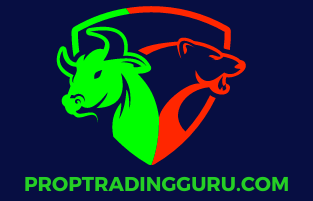When navigating the waters of prop trading, you'll find yourself surrounded by a diverse array of trading instruments, each with its own unique characteristics and potential for profit.
From the familiarity of stocks and bonds to the complexity of derivatives and cryptocurrencies, prop traders have a vast playground to explore.
As you delve into the realm of prop trading instruments, you'll uncover the nuances that make each asset class a compelling choice for maximizing returns and seizing opportunities in the fast-paced world of proprietary trading.
Key Takeaways
- Stocks and Equities are fundamental instruments in prop trading for ownership and profit.
- Options Contracts offer flexibility and risk management strategies for prop traders.
- Futures Markets provide leverage, liquidity, and asset diversity for speculative trading.
- Foreign Exchange (Forex) is a key asset class offering high liquidity and efficient trading opportunities.
Stocks and Equities
Stocks and equities serve as fundamental trading instruments in proprietary trading, embodying ownership stakes within companies. Prop traders utilize these instruments to analyze company performance, market trends, and fluctuations to make strategic trading decisions. By actively trading stocks on exchanges like NYSE and NASDAQ, prop traders can speculate on market movements and capitalize on potential profit opportunities.
In the realm of proprietary trading, stocks and equities play a crucial role in the overall trading strategy. Prop traders rely on in-depth research, advanced tools, and real-time data analysis to identify profitable opportunities in the stock market. Understanding the dynamics of different companies, monitoring market trends, and reacting swiftly to fluctuations are key aspects of successful stock trading in proprietary trading.
As prop traders navigate the complexities of the stock market, their ability to interpret company performance, predict market movements, and execute precise trading decisions is paramount. Stocks and equities offer a dynamic landscape for prop traders to engage with, requiring a blend of analytical skills, market knowledge, and strategic decision-making to thrive in the fast-paced world of proprietary trading.
Options Contracts
Options contracts play a pivotal role in prop trading, offering traders the flexibility to engage in derivative securities for various strategic purposes. These derivative securities provide traders with the right, but not the obligation, to buy or sell an underlying asset at a specified price.
Traders in prop trading utilize options contracts to hedge against risk, speculate on price movements, and leverage their positions for potentially higher returns. Strategies like covered calls, straddles, and strangles are commonly employed in prop trading using options contracts, each with its risk and reward profiles.
To navigate the complexities of options trading, prop traders must grasp concepts like time decay, implied volatility, and the Greeks (Delta, Gamma, Theta, Vega) to make well-informed trading decisions. By employing options contracts effectively, prop traders can implement multi-leg strategies that capitalize on market inefficiencies and pricing anomalies.
Futures Markets
Futures markets in prop trading involve entering contracts to buy or sell assets at a predetermined price on a future date. Traders in prop trading utilize futures contracts for various assets such as commodities, financial instruments, stock indices, and currencies.
These markets enable proprietary traders to profit from price movements and implement hedging strategies effectively. Leveraging futures contracts, traders can magnify their exposure to market movements while benefiting from the liquidity these markets offer.
The ability to speculate on future price changes is a key attraction for prop trading firms operating in futures markets. By participating in futures markets, trading firms can capitalize on market opportunities swiftly and manage risk efficiently.
The combination of leverage, liquidity, and the diverse range of assets available make futures markets a popular choice for prop traders seeking to navigate volatile market conditions with precision.
Foreign Exchange (Forex)
Among the various trading instruments utilized in prop trading, foreign exchange (Forex) stands out as a key asset class for traders seeking high liquidity and efficient trading opportunities.
Forex involves trading currency pairs such as EUR/USD, GBP/JPY, and more. The Forex market operates 24/5, allowing prop traders ample time to capitalize on market movements.
One of the primary attractions of Forex trading is its high liquidity and tight spreads, enabling traders to enter and exit positions with ease. Prop traders rely on advanced tools and analysis to make informed decisions and navigate the complexities of the Forex market.
Commodities Trading
Transitioning from the dynamic world of Forex trading, commodities trading in prop trading involves the exchange of physical goods such as gold, oil, and wheat. Traders in this domain focus on speculating the future price movements of various commodities like precious metals, energy products, agricultural products, and industrial metals.
The volatility inherent in commodity prices creates significant opportunities for prop traders to profit from price swings. To excel in commodities trading, proprietary trading desks rely heavily on advanced analytics and market insights to make well-informed decisions. Precious metals like gold, energy products such as oil, and agricultural staples like wheat are among the most commonly traded commodities in prop trading.
Understanding the intricacies of each commodity market and the factors influencing price movements is crucial for traders aiming to navigate the complexities of commodities trading successfully. By adeptly analyzing market trends and leveraging trading strategies, prop traders can harness the potential of commodities markets to drive profitable outcomes.
Bonds and Fixed Income Securities
Fixed income securities play a pivotal role in prop trading by offering a reliable source of income through fixed interest payments over a specific period while also presenting opportunities for capital appreciation. Bonds, a common type of fixed income security, are issued by governments or corporations to raise capital.
Prop traders utilize bonds and fixed income securities for income generation and risk management within the financial markets. These instruments provide regular interest payments, making them attractive for traders seeking stable returns. Moreover, they offer the potential for capital appreciation, allowing traders to benefit from price increases.
Successful trading in bonds and fixed income securities necessitates a deep understanding of interest rate movements and credit risks. Monitoring interest rates is crucial as they impact bond prices inversely. Additionally, being aware of credit risks associated with bond issuers is essential for effective risk management in trading these financial instruments.
Traders who grasp these dynamics can capitalize on the opportunities presented by bonds and fixed income securities.
Cryptocurrencies
Cryptocurrencies have emerged as highly sought-after trading instruments in prop trading due to their escalating popularity and potential for substantial returns in a condensed timeframe. Traders engage with cryptocurrencies like Bitcoin, Ethereum, and Ripple due to their high volatility and the opportunity for significant returns within short periods.
Prop traders utilize specialized platforms to capitalize on the price movements of these digital assets. Cryptocurrency trading in prop trading involves a mix of short-term speculation and long-term investment strategies. To navigate this market successfully, traders analyze market trends, stay updated on relevant news, and employ technical indicators for making informed decisions.
The ability to interpret and react to the ever-changing landscape of cryptocurrencies is crucial for prop traders looking to leverage these assets effectively.
Frequently Asked Questions
What Tools Do Prop Traders Use?
In prop trading, you use tools like technical analysis, risk management, market research, trading strategies, fundamental analysis, algorithmic trading, economic indicators, price action, trading psychology, and position sizing to make informed decisions and execute trades efficiently.
What Are Prop Trading Instruments?
In prop trading, various instruments like stocks, bonds, commodities, and derivatives are utilized. These tools enable prop traders to implement strategies, manage risks, and capitalize on market trends. Effective use of technical and fundamental analysis enhances trade execution and performance evaluation.
What Are the Most Traded Instruments?
When trading, you'll often come across highly traded instruments like stock options, forex pairs, commodity futures, index CFDs, cryptocurrency markets, and more. These instruments offer diverse opportunities for leveraging and managing risk effectively.
What Instruments Are Available in Smartprop Trader?
In Smartprop Trader, you have access to a diverse array of trading instruments. Engage in Forex pairs, stock options, cryptocurrency markets, commodity futures, bond yields, equity indices, interest rates, derivatives trading, explore market volatility, and analyze asset correlations effortlessly.

